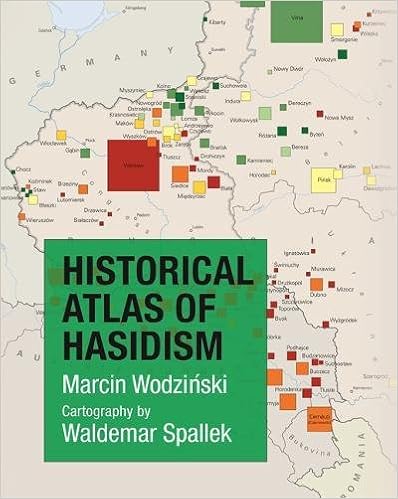Oct 3, 2018
BOOK REVIEW: HISTORICAL ATLAS OF HASIDISM
A Guest Post by Dr Harold Goldmeier
buy Historical Atlas of Hasidism on Amazon.com
Author: Professor Marcin Wodziński
Cartography: Waldemar Spallek
Princeton University Press, Princeton & Oxford
2018
REVIEW BY DR. HAROLD
GOLDMEIER
Dr. Goldmeier is an award
winning businessperson and consultant. He teaches international university
students in Tel Aviv, and offers free public speaking presentations to
community and business groups. His articles and book reviews appear regularly.
I was not compensated for this review except to receive a publisher’s review
copy of the book.
Historical Atlas of Hasidism is
a seminal work no library or university can be without if serious about Jewish
studies, geography, demography, and political science. Individuals from Hasidic
backgrounds or “living the life” will find this book enormously enlightening,
educational, and entertaining.
Hasidism was inspired and nurtured by suffering immiseration and
centuries-long prolific anti-Semitism. This atlas identifies the founders of
Hasidic sects and Hasidic leaders. “Much attention has been given to mapping
the rank-and-file, their prayer sites, pilgrimage routes, economic life, or
contemporary dispersion.”
Hasidism grew as a religious movement heavily influencing all facets
of life across the European continent, Russia, America, and Israel. It fractured into sects with followers
establishing loyalties to emerging religious leaders each of whom interpreted
Jewish law with nuance but all loyal and dedicated to the word of Torah.
“”Hasidism has been conditioned by the spatial characteristics of the movement
not only in its social organizations, but also in its spiritual life, type of
religious leadership, or cultural articulation.”
Historical Atlas is the quintessential book on the entirety of
Hasidism and its adherents. The book offers a unique visual approach to
examining, explaining and demonstrating a divinely inspired multi-national
movement’s past, from the 18th century, and present, through maps,
pictures and text that graciously intertwine. The authors devote about 115 pages to Hasidism
in the Old World, and a near equal number to Hasidism in the New Worlds. They
provide maps and explanations of Hasidic sects thriving from Brooklyn to
Jerusalem. It is well documented with an
extensive bibliography and index.
The book is the first cartographic presentation of Hasidism printed
on heavy slick paper in bright and bold colors. I make sure my hands are clean
and turn each page every time I return to the book with sensitivity not to
leave a fold or mark. Each of the 61 maps, pictures and illustrations is a work
of art. The authors chart the courts,
shtebl’s and synagogues, layouts of the shtetls and towns, and name names in
the Old World and Modern World post-Holocaust.
The book, “Offers the first in-depth analysis of Hasidism’s
egalitarian—not elitist—dimensions” revelatory and inspiring to a novice on the
subject. Disciples of the Great Maggid of Międzyrzecz embarked on large-scale
missionary work (among male Jews) to spread their leader’s glory and learning.
Disciples of the Besht began arriving in 1747 in Palestine. The Besht was the
first Hasid who wished to settle in the Holy Land but could not. The authors
tell the stories and show the locations of Hasidim who made aliyah and built
thriving communities in Israel some with strong political and cultural sway
today.
Here is one final story capturing the magic and enchantment of
history through maps in this atlas. My wife’s family was murdered during the
war. Her mother repeatedly told her about the town in Poland from which she
came at the foot of the Carpathian Mountains.
My wife with some anxiousness opened Historical Atlas searching the maps. There was her family’s town for decades if
not centuries right at the foot of the Mountains her mother so lovingly
described. My wife was mesmerized and went back to the map several more times.
My father’s family is German Jews. Unfortunately, the authors offer
no explanation why Hasidic movements did not take hold in any important number
in Germany. That might make an interesting chapter in itself.
------------------------------------------------------
Reach thousands of readers with your ad by advertising on Life in Israel
Reach thousands of readers with your ad by advertising on Life in Israel
------------------------------------------------------
Subscribe to:
Post Comments (Atom)


No comments:
Post a Comment